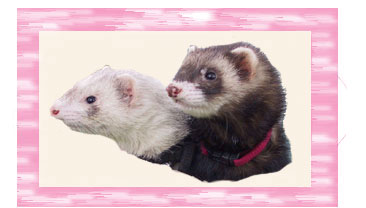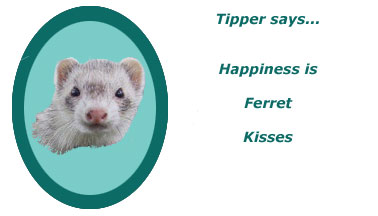 Deciding If a Ferret is Right For You...
There are some things to consider when deciding on whether to purchase
a ferret, such as: 1)Time - Ferrets are interactive and social creatures. Consider if you have time in your schedule or if this
"eager to entertain you" creature will spend most of its time in a cage. These active, intelligent
creatures are definitely high maintenance. 2)Odor - Yes, these cuties do have a distinctive odor to them but most people don't find it offensive. Even
if your ferret has been descented it will still have a slight odor. Descenting only removes the scent glands around the anus, leaving other scent glands on the ferrets body. 3)Financial Considerations - Ferrets need proper housing, safe toys, and high quality food. These are essential. Further costs
include veterinary care which involves checkups, shots, and other procedures that may occur. Remember a ferret ages, so does the risk of illness and disease. 4)Housing a ferret - As social as ferrets are, they still need a safe, comfortable, quiet place of their own. There are many kinds of cages on the market starting from starter kits to custom designs. The size of the cage should be dependent on how many ferrets and how long they will spend in it. The more ferrets, the bigger
the cage. The longer the time a ferret spends in lock-up, the bigger the cage. 
5)Feeding Your Ferret - Because ferrets are strictly carnivores, they need high protein (no less than 34%),no less than 20% fat, should have very little vegetable product or animal by product. The main ingredient should be meat or poultry; avoid products that list corn meal or another plant material as a first ingredient (in fact, within the first 5 ingredients is the usual rule of thumb). Ferret foods or high protein kitten foods can be expensive, but they are necessary for a healthy
ferret.
Preparing For Your Ferret - Ferret Proofing The following is a list of items to be on the look out before you bring home your new fuzzie. These are the most obvious risks but be sure to take a look around your home and take care of the hazards before you bring home the ferret. An ounce of prevention guarantees a happy, safe life for your ferret. Common things to look out for:
*Check every piece of furniture; look for openings where ferrets can become trapped.
*Measure gaps under doors.
*Make sure windows are secure as well as the screens.
* Recliners and rocking chairs....please, please be careful when your ferret is out.
*Ferrets and laundry rooms don't mix. They love to dig into the hoses and this provides an easy way outside. Also, when doing laundry, be sure to check to make sure that the ferret isn't in the machines and/or in the clothes as they are being put into the machine.
*In the kitchen, check for open spaces at the bottom of your fridge, stove and other appliances. This was a favorite hiding place for my ferrets, until I inserted cardboard around the bottom of the appliances and the ferrets gave up.
*Check under sinks...sometimes when installing a sink there are large openings in the floorboards. Be sure to cover these or secure cabinet drawers. Smaller items to look for:
*Door stops
*Shoe insoles and rubber soles
*Rubber bands
*Balloons
*Pencil erasers
*Ear plugs
*Weather stripping
*Foam padding beneath furniture
*Rubber buttons such as those on remote controls, and cell phones
*Rubber feet such as those found on radios, clocks, and electronic components
*Items with rubberized grips such as toothbrushes, combs, pens
*Rubber toys
*Plastic bags and other rippable plastic items

Back To Top Of Page
|




